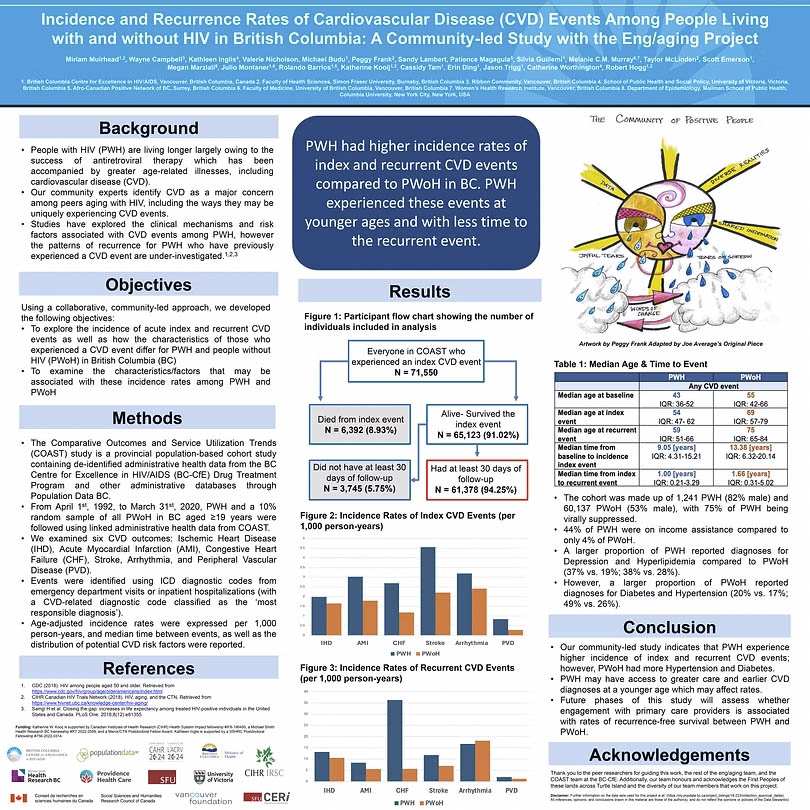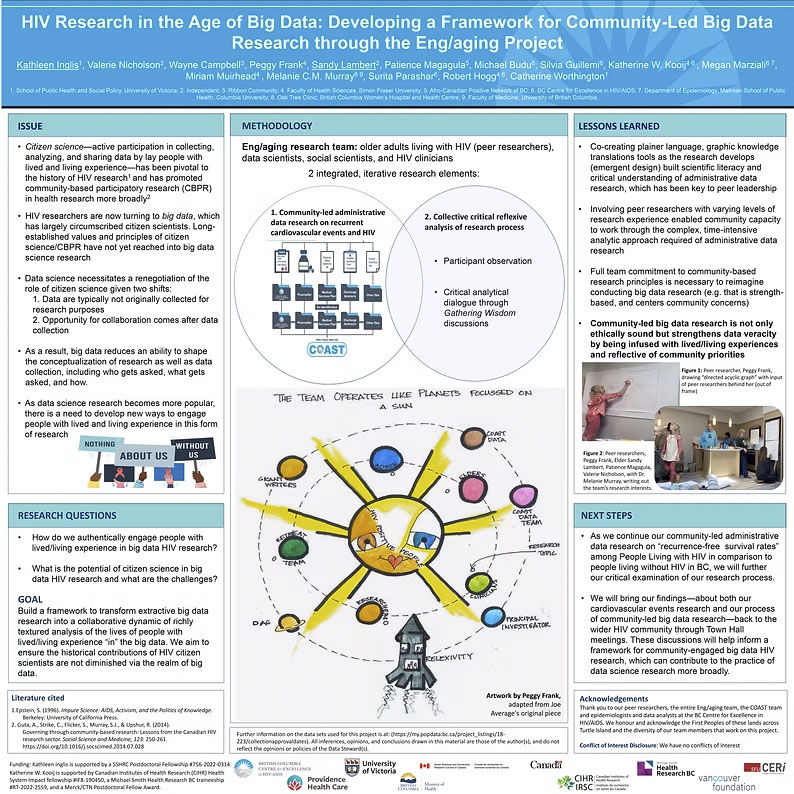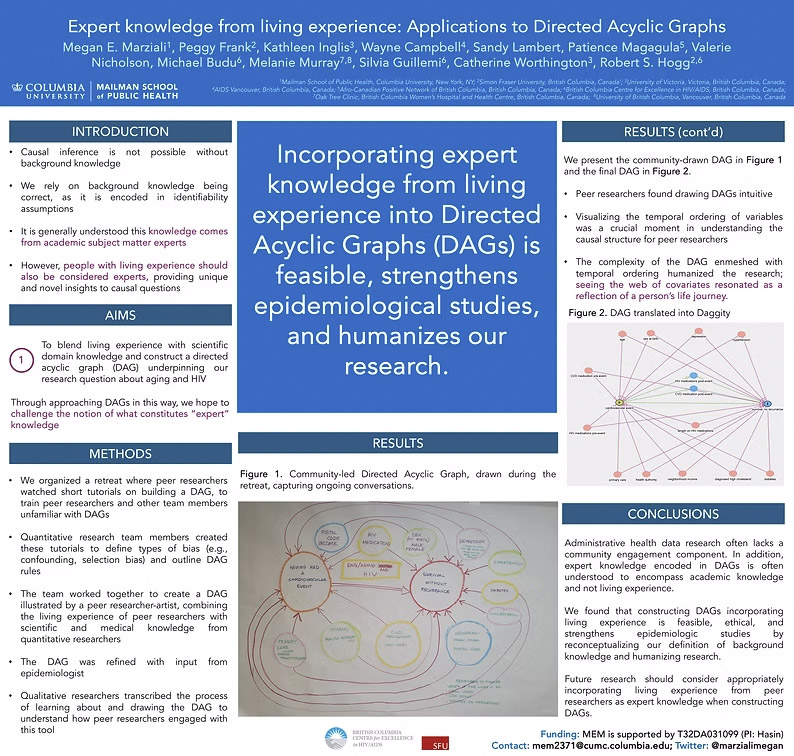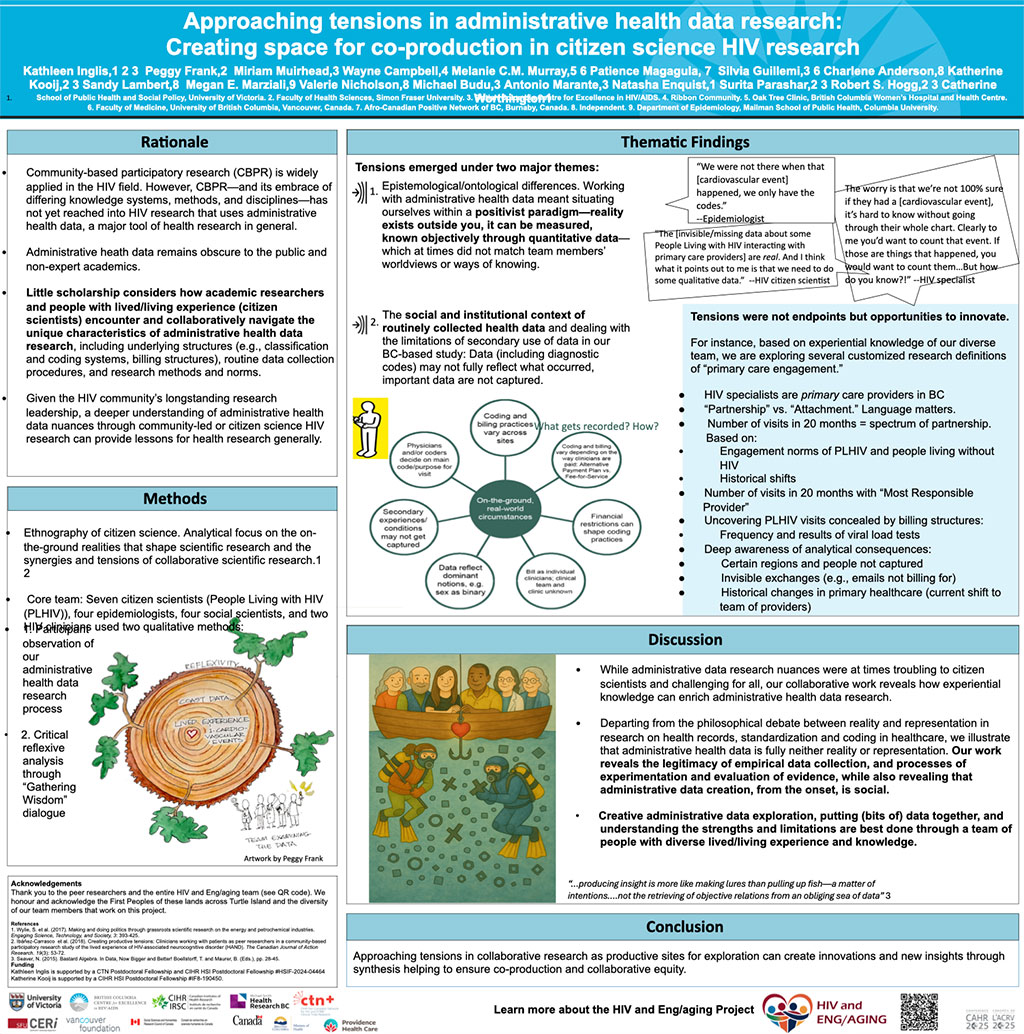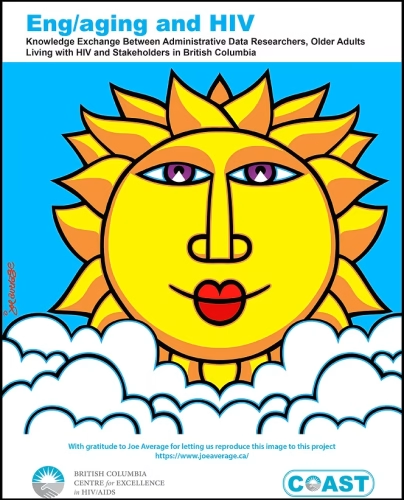STUDIES MENU
Findings
RESEARCH SUMMARIES AND POSTERS
Research Study #1: “Incidence and Recurrence Rates of Cardiovascular Disease (CVD) Events Among People Living with and without HIV in British Columbia: A Community-led Study with the Eng/aging Project”
Poster by Muirhead et al. (CAHR 2024)
Read more
Muirhead, M., Campbell, W., Inglis, K., Nicholson, V, Budu, M., Frank, P., Lambert, S., Magagula, P., Guillemi, S., Murray, M.C.M., Ding, E., Tam, C., McLinden, T.,Emerson, S., Marziali, M.E., Montaner, J., Barrios, R., Kooij, K., Worthington, C., and Hogg, R.S
Conference: 33rd Canadian Conference on HIV/AIDS Research (CAHR 2024), London, ON, Canada.
Plain language summary:
Using a strengths-based approach, our community-led research team explored the patterns of cardiovascular disease (CVD) among people with HIV (PWH) and people without HIV (PWoH) in British Columbia (BC), focusing on the incidence of index and recurrent CVD events. In other words, we look at how often first and second CVD events occur over time in each group. Additionally, we assess participant characteristics such as sex, age, and co-occurring health conditions, and how these differ between PWH and PWoH. We used the Comparative Outcomes and Service Utilization Trends (COAST) study, which uses administrative health data from people in BC. Overall, we found that the incidence rates for both index and recurrent CVD events were significantly higher among PWH compared to PWoH. Notably, PWH were having recurrent CVD events sooner after index events compared to PWoH. For PWH, the median time between the first and second CVD event was 1 year, while for PWoH, it was 1.66 years. PWH were also experiencing recurrent events at younger ages. The median age of PWH at the recurrent event was 59, compared to 75 for PWoH. Our community experts suggest that PWH may have greater access to care which may help explain these findings. This is something that we hope to explore in future phases of this study.
Research Study #2: "HIV Research in the Age of Big Data: Developing a Framework for Community-Led Big Data Research through the Eng/aging Project"
Poster by Inglis et al. (CAHR 2024)
Read more
Inglis, K., Nicholson, V., Campbell, W., Frank, P., Lambert, S., Magagula, P., Budu, M., Guillemi, S., Kooij, K., Marziali, M. E., Muirhead, M., Murray, M.C.M., Parashar, S., Hogg, R.S and Worthington, C
Conference: 33rd Canadian Conference on HIV/AIDS Research (CAHR 2024), London, ON, Canada.
Plain language summary:
Since the beginning of the HIV epidemic, community members have played a crucial role in ensuring that People Living with HIV are actively involved in all aspects of HIV research, from developing research questions to mobilizing knowledge gained (also known as community-based participatory research). However, administrative health data research compels us to reimagine community-based research due to two major shifts: 1. The numeric, administrative data are not originally collected for research purposes; and 2. Opportunity for collaboration comes after data collection. With data collection design and control removed from their toolkit, what is the potential of community members to maximize administrative data research? What are the challenges? We found that community-led administrative data research is not only ethically sound, but strengthens research because community members’ lived/living experiences help identify relevant questions that can harness the administrative data; interpret the meaning behind the numbers; and understand fully the limitations of the available data. We also found that because administrative data research is highly technical, our success lied in having some peer researchers with extensive research experience, albeit qualitative in nature. Their familiarity with complex, long-term projects aided our team’s tenacity required in administrative health data research.
Research Study #3: "Expert knowledge from living experience: Applications to Directed Acyclic Graphs"
Poster by Marziali et al. (SER 2024)*
Read more
Marziali, M.E., Inglis, K., Frank, P., Campbell, W., Lambert, S., Magagula, P., Nicholson, V., Budu, M., Murray, M.C.M, Guillemi, S., Worthington, C., and Hogg, R.S. Conference: Society for Epidemiologic Research Annual Conference, Austin, TX., 2024.
* Marziali won best departmental abstract submitted to the Society for Epidemiological Research Conference, Department of Epidemiology, Columbia University Mailman School of Public Health, June 2024
Plain language summary:
Directed Acyclic Graphs (DAGs) are a graphical tool to help visualize relationships between variables or factors in epidemiological studies. Essentially, researchers who use DAGs will draw a graph representing the theory behind their research study. They will draw the exposure and the outcome (which could be a health status or condition), and connect the two variables by drawing an arrow originating from the exposure and leading to the outcome. That arrow represents a causal relationship, meaning that the researcher is hypothesizing that the exposure causes the outcome. They will then add other variables that cause both the exposure and the outcome; these variables are referred to as “confounders.” It is important to identify potential confounders in studies because they can cause bias; in short, if researchers don’t properly adjust for confounders, the estimate that we get from our statistical analysis can be incorrect (biased). Currently, researchers rely on academic knowledge and relationships published in the literature (often called “expert knowledge”) to be able to identify confounders. We theorized that this approach is limited, and a more appropriate method for identifying confounders and relationships between variables would be to include people with lived/living experience relevant to the exposure and outcome relationship under study. Using this lens, and redefining “expert knowledge” to include people with lived/living experience, our team co-created a DAG. Peer researchers described the DAG process as humanizing the research. We argue that this method is both a more ethical and sound way to conduct our work and could help to improve the accuracy of our results by minimizing sources of bias.
Research Study #4: "Approaching tensions in administrative health data research: creating space for co-production in citizen science HIV research."
Poster by Inglis et al. (CAHR 2025)
Read more
Authors: Inglis, K., Frank, P., Muirhead, M., Campbell, W., Murray, M.C.M., Magagula, P., Guillemi, S., Anderson, C., Kooij, K., Lambert, S., Marziali, M.E., Nicholson, V., Budu, M., Enquist, N., Hogg, R.S., and Worthington, C.
Conference: 34th Canadian Conference on HIV/AIDS Research (CAHR 2025), Halifax, NS.
Plain language summary:
Little scholarship considers how academic researchers and people with lived/living experience collaboratively navigate the unique characteristics of a common type of research called administrative health data research (data electronically generated at each encounter with the health care system for administrative or billing purposes, including medical and demographic information). While conducting administrative health data research, our community-led team analyzed our process through participant observation and critical reflexive analysis. Our team experienced two major kinds of “tensions:” 1. Working with administrative data meant situating ourselves within a positivist paradigm, which at times did not match team members’ worldviews or ways of knowing. 2. The context/conditions through which administrative data are made meant data codes may not fully reflect what occurred and important data are not captured, which were limitations deeply felt by peer researchers who saw themselves as the numbers. Tensions were not simply endpoints, but opportunities to innovate; for example, we customized a definition of “primary care engagement” based on the experiences of peer researchers and HIV clinicians. There is a common expression that administrative health data research is like pulling up fish, as if data were fixed, bounded, objective entities. In contrast, we argue that administrative data research is about making meaning by knowing how to put (bits of) data together, transforming the original data, which is best done with a community-led, diverse team.
Publications
Who is the expert? A process guide to incorporate lived/living experience into Directed Acyclic Graphs
Marziali, M.E., Inglis, K., Frank, P., Campbell, W., Lambert, S., Magagula, P., Nicholson, V., Budu, M., Murray, M.C.M., Guillemi, S., Worthington, C. and Hogg, R.S.
Plain language summary: Causal inference is the process of determining whether the exposure (e.g., health status or condition) causes the outcome (e.g., different health status or condition) under study. Causal inference relies on correct background knowledge. Epidemiologists generally understand this knowledge to come from academic subject matter experts. We argue that people with lived/living experiences should also be considered experts, providing unique and novel insights to causal questions. Our diverse Eng/aging team of quantitative and qualitative researchers, including People Living with HIV (peer researchers), blends lived/living experience with scientific domain knowledge to construct a directed acyclic graph (DAG) underpinning our research question about aging and HIV, challenging the notion of what constitutes “expert” knowledge. Peer researchers found drawing DAGs intuitive and we found drawing DAGs to stimulate conversations around the limitations of the data and our research. Constructing DAGs incorporating lived/living experience is both ethical and feasible. It strengthens and humanizes epidemiologic studies by rethinking our definition of background knowledge.
COAST booklet
Eng/aging and HIV: Knowledge Exchange Between Administrative Data Researchers, Older Adults Living with HIV and Stakeholders in British Columbia
News & Blog
October 08, 2024
The Meaningful Involvement of People of People Living with HIV/AIDS (MIPA) in big data research: The Eng/aging project

